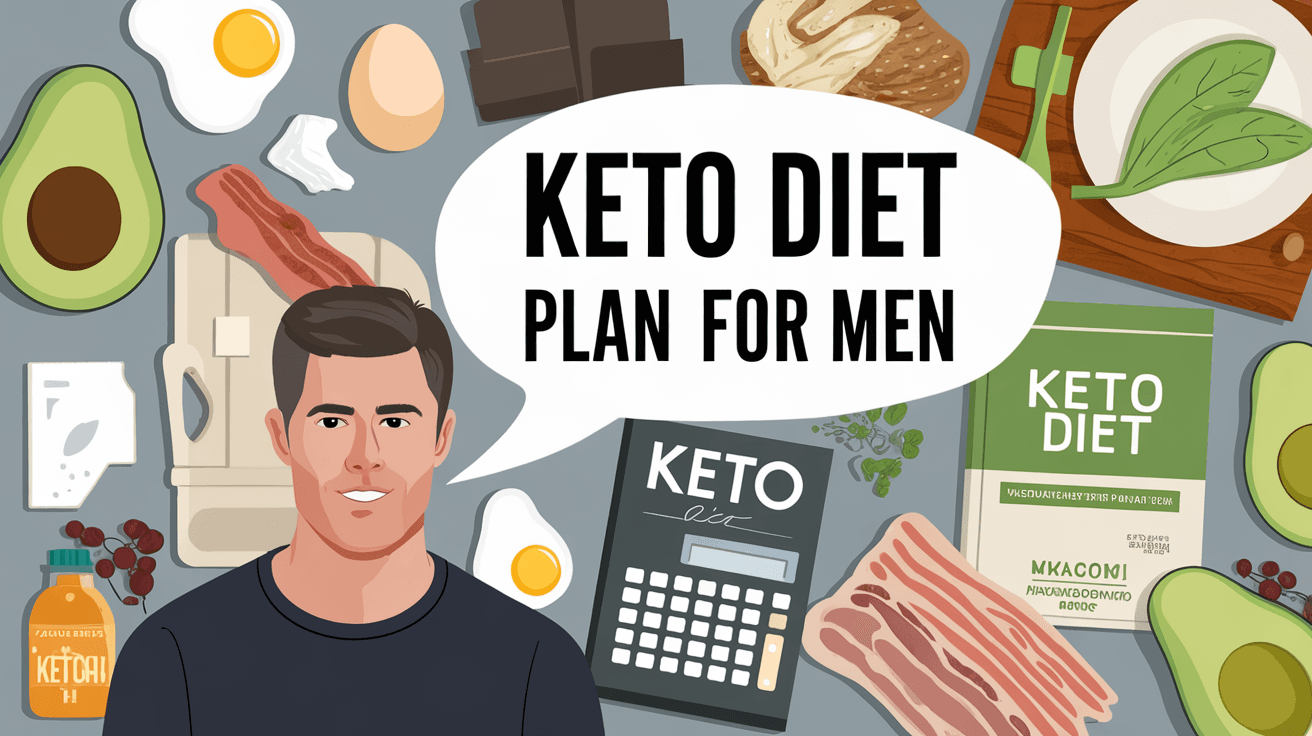Are you tired of generic diet plans that leave you hungry and frustrated? If you’re wondering how to do keto diet for men effectively, you’ve come to the right place. The ketogenic diet offers a powerful solution specifically tailored to men’s unique nutritional needs and metabolic advantages. This comprehensive guide reveals the best keto diet plan for men to lose weight, including what to eat, meal prep strategies, and proven techniques for sustainable results.
Why the Keto Diet Works Differently for Men
Men possess distinct physiological advantages that make the ketogenic diet particularly effective. Understanding these differences is crucial for maximizing your results and creating a sustainable approach to healthy eating.
The Testosterone Advantage
Total testosterone increased significantly from weeks 0 to 11 in the KD diet (118 ng·dl) as compared to the WD (-36 ng·dl) from pre to post according to research published in PubMed. This hormonal advantage creates several benefits for men following keto:
- Enhanced muscle preservation during fat loss phases
- Accelerated ketone production when carbohydrates are restricted
- Higher baseline metabolic rate requiring increased caloric intake
- Improved fat distribution patterns, particularly targeting stubborn visceral fat
The relationship between keto and testosterone is particularly compelling. KD improved testosterone levels depending on both patients’ age and KD-induced weight loss, suggesting that the benefits compound over time and with consistent adherence.
Higher Caloric Requirements and Natural Satiety
Men typically require 2,200-3,000 calories daily, far exceeding the restrictive 1,200-1,500 calorie plans common in mainstream dieting approaches. The ketogenic diet’s high fat content provides exceptional satiety, making it easier to maintain appropriate calorie levels without constant hunger.
The appetite-regulating effects of ketosis work particularly well for men who struggle with portion control on carbohydrate-heavy diets. High-fat meals trigger satiety hormones more effectively, leading to natural calorie regulation without the need for strict portion restrictions.
What to Eat on Keto Diet Men: Essential Foods and Guidelines
Understanding what to eat on keto diet men is crucial for success. The male-focused ketogenic approach emphasizes foods that support higher caloric needs, testosterone production, and muscle maintenance.
How to Calculate Your Keto Macros as a Man
After understanding what to eat, proper macro calculation forms the foundation of successful male keto implementation. Unlike generic recommendations, men require personalized calculations based on body composition, activity level, and specific goals.
- Protein: 1.0-1.2g per pound of lean body mass (higher for active men)
- Carbohydrates: 20-30g net carbs daily (can increase for very active individuals)
- Fat: 70-75% of remaining calories
Example calculation for a 190-pound man with 18% body fat:
- Lean body mass: 156 pounds
- Protein target: 156-187g daily
- Carbohydrate limit: 20-30g net daily
- Fat intake: 150-190g daily
- Total calories: 2,000-2,600 (depending on goals)
For personalized macro calculations tailored to your specific measurements, check out our keto macros calculator designed specifically for men’s needs.
Goal-Specific Adjustments
Fat Loss Focus:
- Maintain protein at 1.0-1.2g per pound LBM
- Create a 20-25% caloric deficit
- Prioritize nutrient-dense whole foods
Muscle Building/Maintenance:
- Increase protein to 1.2g per pound LBM
- Eat at maintenance or slight surplus
- Consider strategic carb timing around workouts
Athletic Performance:
- Allow 30-50g carbs for high-intensity training
- Time carbohydrate intake around workout sessions
- Consider targeted ketogenic diet (TKD) approaches
14-Day Keto Meal Plan for Men
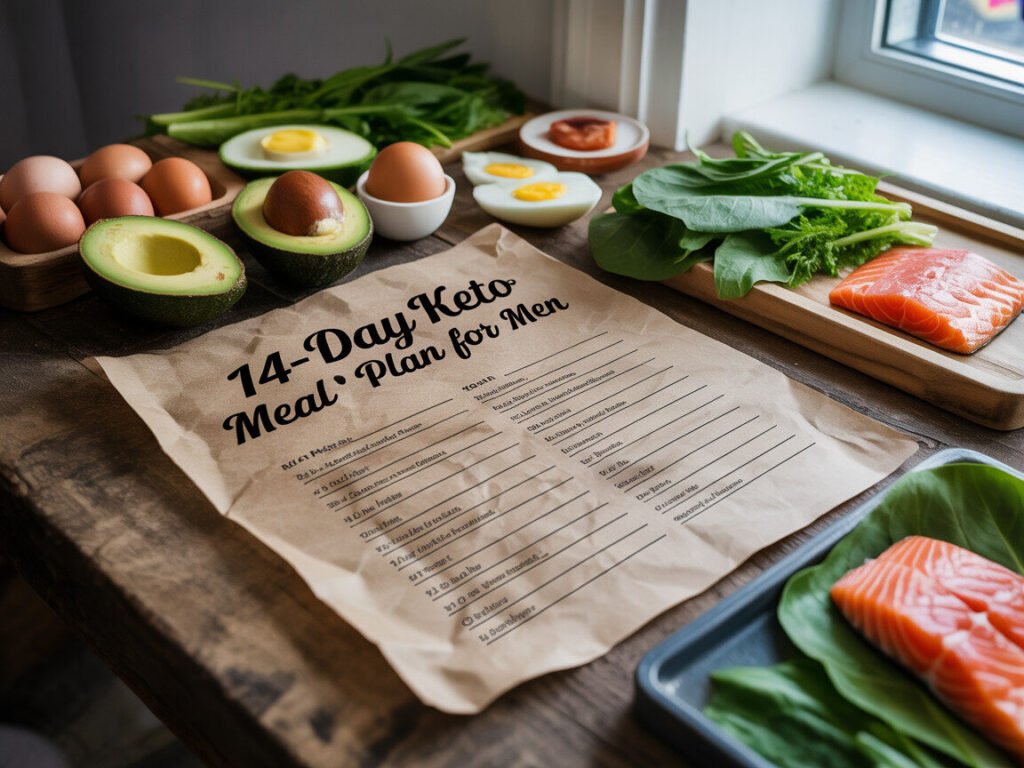
This comprehensive meal plan provides 2,200-2,400 calories daily with optimal macro distribution for sustainable weight loss and energy maintenance.
Week 1
Day 1
- Breakfast: 3-egg omelet with 2 oz sharp cheddar, sautéed bell peppers, and mushrooms cooked in 2 tbsp grass-fed butter
- Lunch: 6 oz ground beef burger (no bun) topped with 1 oz cheese, 2 cups mixed greens, ½ avocado, 2 tbsp olive oil dressing
- Dinner: 8 oz salmon fillet with lemon butter, 2 cups roasted asparagus with parmesan, side salad with olive oil
- Snack: 1.5 oz macadamia nuts
Day 2
- Breakfast: 2 eggs fried in coconut oil, 3 strips bacon, ½ avocado with sea salt
- Lunch: 6 oz rotisserie chicken (with skin), 2 cups spinach salad with feta, olives, and olive oil dressing
- Dinner: 8 oz ribeye steak, cauliflower mash with butter and cream, sautéed zucchini in garlic oil
- Snack: 2 hard-boiled eggs with everything bagel seasoning
Day 3
- Breakfast: Keto smoothie with 1 scoop whey protein, coconut milk, almond butter, MCT oil, and ice
- Lunch: Tuna salad made with 6 oz canned tuna, mayo, celery, served over mixed greens with avocado
- Dinner: 6 oz pork chops with herb butter, roasted brussels sprouts with bacon, side of coleslaw
- Snack: 1 oz cheese with 10 olives
Week 2 Continuation
Continue this pattern with variety in protein sources (chicken thighs, lamb, fish), rotating vegetables (broccoli, cauliflower, green beans), and adjusting portions based on your specific caloric needs.
For complete meal prep strategies and shopping lists optimized for men’s portions and preferences, visit our keto meal prep guide for men.
Keto Diet Plan for Men Over 40 Free: Special Considerations
Men over 40 face unique challenges that require modified approaches to ketogenic eating. This keto diet plan for men over 40 free guidance addresses age-related metabolic changes, hormone fluctuations, and lifestyle factors that influence optimal keto implementation.
Metabolic Adjustments After 40
Due to anabolic resistance, which increases as we age, it’s recommended to increase protein intake per meal to roughly 30 – 35 grams. This research from Stanford’s longevity program highlights the importance of adequate protein distribution throughout the day.
Key modifications for men over 40:
- Increase protein to 1.2-1.4g per pound of lean body mass
- Focus on nutrient density to support declining absorption
- Emphasize anti-inflammatory foods like fatty fish and leafy greens
- Consider intermittent fasting windows of 14-16 hours
Hormone Optimization Strategies
Testosterone naturally declines by 1-2% annually after age 30. The ketogenic diet can help counteract this decline through several mechanisms:
- Increased cholesterol intake supports hormone production
- Reduced insulin levels improve testosterone sensitivity
- Weight loss reduces aromatase activity (testosterone to estrogen conversion)
- Improved sleep quality enhances recovery and hormone production
For detailed information about keto’s impact on male hormones, explore our guide on keto and testosterone.
Male Keto Diet Meal Prep Ideas: Efficient Strategies for Busy Men
Successful keto adherence requires efficient male keto diet meal prep ideas that fit busy male lifestyles. Focus on batch cooking, strategic storage, and portable options that support your weight loss goals.
Weekly Prep Strategy
Sunday Prep Session (2-3 hours):
- Cook 3-4 pounds of protein (chicken thighs, ground beef, salmon)
- Prepare 6-8 cups of low-carb vegetables
- Hard-boil 12 eggs for quick snacks
- Pre-portion nuts and cheese for grab-and-go options
Storage Solutions:
- Glass containers for hot meals (prevent plastic chemicals)
- Vacuum-sealed bags for marinated proteins
- Pre-washed salad mixes for easy assembly
- Portioned fat sources (olive oil, butter, nuts)
Portable Meal Ideas:
- Protein salad wraps using large lettuce leaves
- Cheese and meat roll-ups with avocado
- Keto-friendly protein bars (check carb content)
- Nuts and seeds mixed with small amounts of berries
Men’s Keto Diet Shopping List: Essential Foods for Success
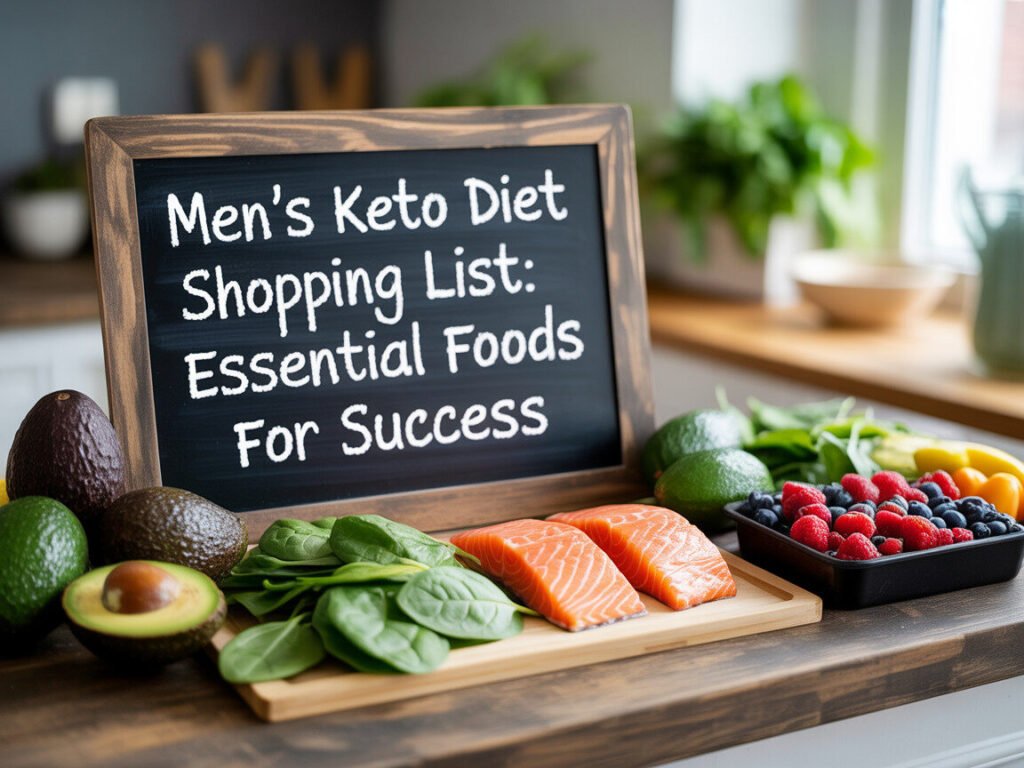
Strategic shopping ensures you have keto-friendly options readily available while avoiding impulse purchases of high-carb foods. This comprehensive men’s keto diet shopping list covers all essentials for male-specific nutritional needs.
Protein Sources
- Red Meat: Grass-fed beef, lamb, venison
- Poultry: Chicken thighs with skin, whole chickens, turkey
- Fish: Salmon, mackerel, sardines, tuna
- Eggs: Pasture-raised when possible
- Dairy: Full-fat Greek yogurt, cheese varieties
Healthy Fats
- Oils: Extra virgin olive oil, avocado oil, coconut oil
- Nuts/Seeds: Macadamias, walnuts, pecans, chia seeds
- Other: Avocados, olives, MCT oil
Low-Carb Vegetables
- Leafy Greens: Spinach, kale, arugula, lettuce
- Cruciferous: Broccoli, cauliflower, brussels sprouts
- Others: Zucchini, bell peppers, asparagus, cucumber
Pantry Staples
- Sea salt, black pepper, garlic powder
- Apple cider vinegar, lemon juice
- Herbs and spices (oregano, basil, paprika)
- Bone broth, coconut milk
How Much Protein on Keto Men: Optimizing Your Intake
One of the most common questions is how much protein on keto men should consume. Protein requirements for men on keto exceed standard dietary recommendations due to higher muscle mass, increased activity levels, and the muscle-preserving benefits during fat loss phases.
Calculating Individual Protein Needs
Base Requirements:
- Sedentary men: 1.0g per pound of lean body mass
- Active men: 1.1-1.2g per pound of lean body mass
- Very active/athletic men: 1.2-1.4g per pound of lean body mass
Practical Application: For a 200-pound man with 20% body fat (160 pounds lean mass):
- Minimum: 160g protein daily
- Active lifestyle: 176-192g protein daily
- Athletic training: 192-224g protein daily
Timing and Distribution
Distribute protein intake across 3-4 meals to optimize muscle protein synthesis:
- Breakfast: 30-40g protein
- Lunch: 35-45g protein
- Dinner: 40-50g protein
- Post-workout (if applicable): 25-35g protein
Overcoming Common Keto Challenges for Men
Men face specific obstacles when transitioning to ketogenic eating. Understanding these challenges and having practical solutions ensures long-term success.
Managing Social Situations
Male social activities often revolve around food and alcohol, creating potential adherence challenges.
Strategies:
- Research restaurant menus in advance
- Suggest keto-friendly venues when planning outings
- Switch from beer to spirits with zero-carb mixers
- Become the designated grill master at gatherings
- Prepare standard responses to peer pressure
Addressing Energy Dips During Adaptation
The initial 2-4 weeks of keto can involve energy fluctuations as the body adapts to fat metabolism.
Solutions:
- Increase electrolyte intake (sodium, potassium, magnesium)
- Consider MCT oil for quick energy during transition
- Maintain adequate sleep (7-9 hours nightly)
- Reduce training intensity temporarily during adaptation
- Stay hydrated with 3-4 liters of water daily
Maintaining Performance in the Gym
Athletic men worry about strength and endurance during keto adaptation.
Performance Optimization:
- Allow 4-6 weeks for full fat adaptation
- Consider targeted carbs (15-30g) around intense workouts
- Emphasize creatine supplementation for power output
- Focus on adequate protein for recovery
- Time workouts during higher energy periods
For comprehensive guidance on building and maintaining muscle while following keto, check out our keto muscle building guide.
Free Keto Meal Plan for Men PDF Resources
While many meal plans require payment, several high-quality free keto meal plan for men PDF resources exist for men starting their keto journey. These downloadable guides provide structured approaches to male-focused ketogenic eating.
What to Look for in Quality Meal Plans
Essential Components:
- Macro breakdowns for each meal
- Shopping lists organized by food category
- Preparation time estimates
- Scaling instructions for different calorie needs
- Substitution suggestions for food preferences/allergies
Customizing Generic Plans
Most free meal plans target average calorie needs (1,600-1,800 calories). Men typically need to scale recipes by 125-150% to meet their higher requirements.
Scaling Strategy:
- Increase protein portions by 1.5x
- Add extra healthy fats (olive oil, nuts, avocado)
- Include additional low-carb vegetables
- Consider extra snacks between meals
Keto Diet Men’s Health Magazine Tips: Evidence-Based Approaches
Leading publications like keto diet men’s health magazine consistently highlight the unique benefits of ketogenic eating for male physiology. The ketogenic diet offers numerous health benefits for men beyond simple weight reduction, supporting cardiovascular health, hormone optimization, and athletic performance.
Cardiovascular Health Improvements
Research demonstrates several cardiovascular benefits of properly implemented ketogenic diets:
- Improved HDL cholesterol levels
- Reduced triglycerides
- Better blood pressure control
- Decreased inflammation markers
Mental Performance and Clarity
Many men report enhanced cognitive function on keto:
- Improved focus and concentration
- Stable energy levels throughout the day
- Better mood regulation
- Enhanced problem-solving abilities
Athletic Performance Benefits
Once fully adapted, many male athletes experience:
- Improved endurance capacity
- Better fat oxidation during exercise
- Reduced exercise-induced inflammation
- Enhanced recovery between training sessions
For more detailed information about keto’s comprehensive benefits for men, visit our keto benefits for men resource page.
Easy Keto Recipes for Men: Quick and Satisfying Options
Busy men need simple, satisfying recipes that don’t require extensive cooking skills or preparation time. These easy keto recipes for men focus on high-protein, high-fat meals that support weight loss goals while fitting into demanding schedules.
15-Minute Breakfast Options
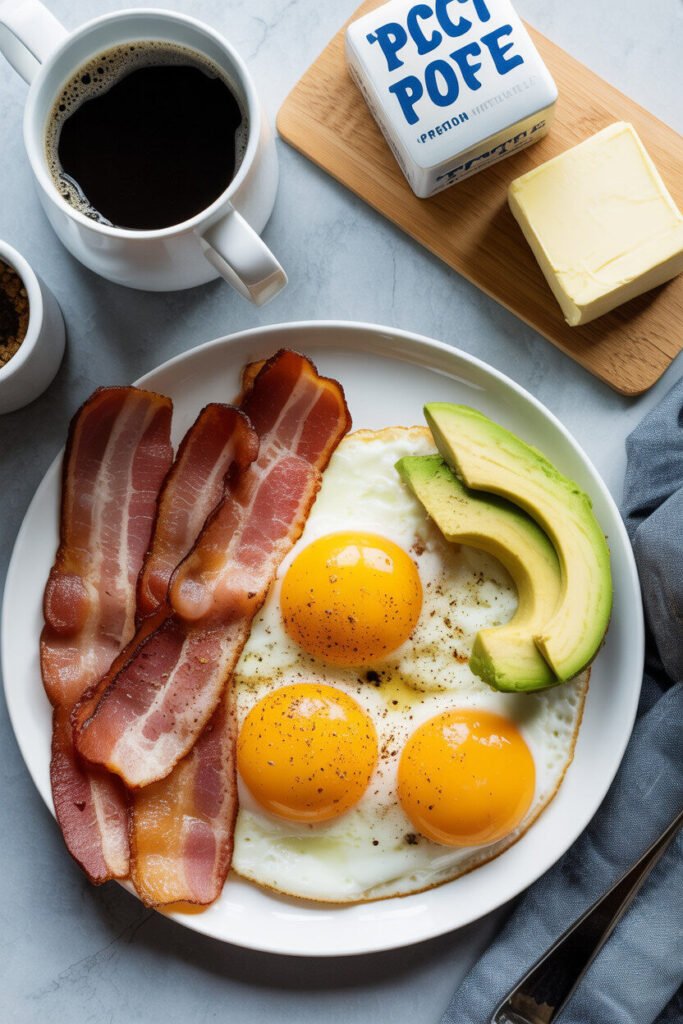
Bacon and Egg Scramble
- 3 eggs scrambled in bacon fat
- 3 strips cooked bacon
- ½ avocado sliced
- Salt and pepper to taste Macros: 28g fat, 22g protein, 4g net carbs
Protein Coffee
- 12 oz black coffee
- 1 scoop vanilla whey protein
- 1 tbsp MCT oil
- 1 tbsp grass-fed butter Blend and enjoy immediately
20-Minute Lunch Solutions

Chicken Thigh Power Bowl
- 6 oz boneless chicken thighs, seasoned and pan-fried
- 2 cups mixed greens
- ¼ cup shredded cheese
- 2 tbsp ranch dressing
- 10 cherry tomatoes
30-Minute Dinner Ideas
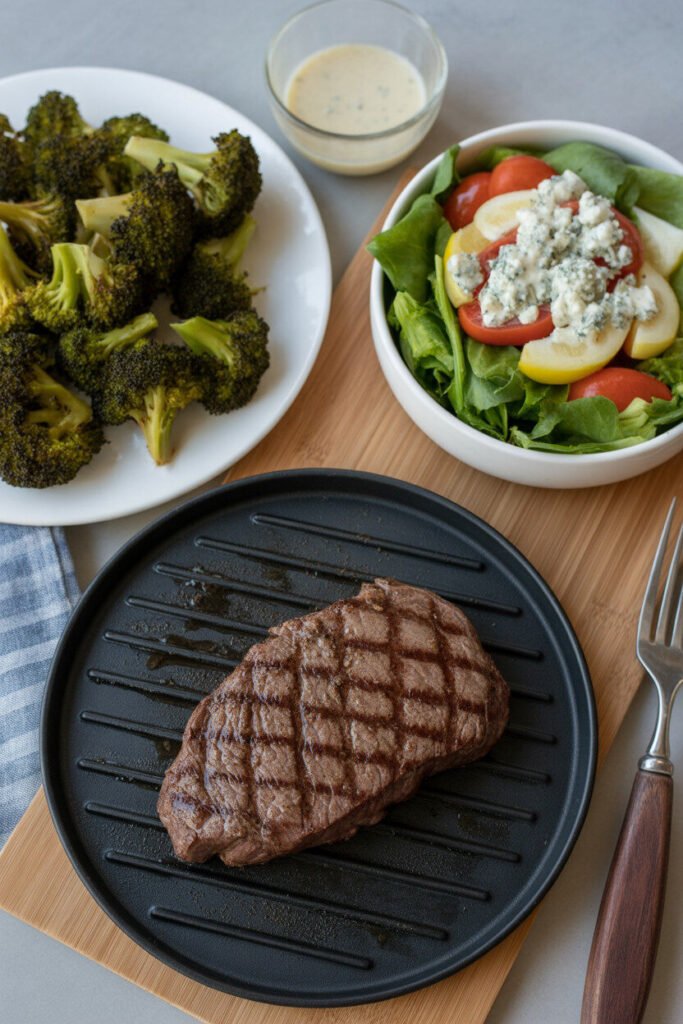
Steak and Vegetables
- 8 oz sirloin steak, grilled to preference
- 1 cup roasted broccoli with garlic and olive oil
- Side salad with blue cheese dressing
Tracking Progress: Beyond the Scale
Men often focus exclusively on weight changes, missing other important indicators of keto success.
Key Metrics to Monitor
Body Composition Changes:
- Waist circumference measurements
- Progress photos from multiple angles
- Clothing fit and belt notches
- Body fat percentage (if available)
Performance Indicators:
- Energy levels throughout the day (1-10 scale)
- Sleep quality and duration
- Workout performance and recovery
- Mental clarity and focus
Health Markers:
- Blood pressure readings
- Resting heart rate
- Laboratory values (if ordered by physician)
- Inflammatory markers improvement
Setting Realistic Expectations
On average, men can expect to lose 1-2 pounds per week on the keto diet. However, weight loss isn’t linear, and men often experience:
- Rapid initial water weight loss (3-7 pounds in week 1)
- Slower, steady fat loss after adaptation (1-2 pounds weekly)
- Occasional plateaus lasting 1-2 weeks
- Non-scale victories becoming more apparent over time
Supplementation for Male Keto Success
While whole foods should form your foundation, strategic supplementation can enhance results and address potential nutrient gaps.
Essential Supplements
Electrolyte Support:
- Sodium: 2,000-3,000mg daily (especially important for active men)
- Potassium: 3,000-4,000mg daily from food and supplements
- Magnesium: 400-600mg daily (glycinate or citrate forms)
Performance Enhancement:
- Creatine monohydrate: 5g daily for strength maintenance
- MCT oil: 1-2 tbsp daily for energy and ketone production
- Omega-3 fatty acids: 2-3g daily for inflammation control
Optional Additions
For Men Over 40:
- Vitamin D3: 2,000-4,000 IU daily (support testosterone production)
- Zinc: 15-30mg daily (immune function and hormone support)
- CoQ10: 100-200mg daily (cardiovascular and energy support)
Long-Term Success Strategies
Sustainable keto implementation requires planning for long-term adherence and lifestyle integration.
Building Flexibility
The 80/20 Approach:
- Maintain strict keto 80% of the time
- Allow controlled flexibility for special occasions
- Return to strict adherence within 24-48 hours
- Don’t let single meals become extended breaks
Meal Rotation System
Develop a rotation of 15-20 go-to meals you genuinely enjoy:
- 5-6 breakfast options
- 5-6 lunch options
- 6-8 dinner options
- Multiple snack combinations
This prevents boredom while maintaining nutritional consistency.
Social Support Networks
Connect with other men following ketogenic lifestyles:
- Join online communities focused on male keto experiences
- Find workout partners with similar dietary approaches
- Share meal prep responsibilities with family members
- Consider working with a keto-experienced nutrition coach
Frequently Asked Questions
Q: How long does it take to see results on keto as a man? A: Most men notice initial weight loss within 3-5 days (primarily water weight), with fat loss becoming apparent after 2-3 weeks. Full adaptation typically occurs within 4-6 weeks.
Q: Can I build muscle while on keto? A: Yes, men can successfully build muscle on keto by maintaining adequate protein intake (1.2-1.4g per pound of lean body mass), following progressive resistance training, and ensuring sufficient calories.
Q: Do I need to count calories on keto? A: While keto’s appetite-suppressing effects often lead to natural calorie regulation, men with specific body composition goals may benefit from tracking intake initially to establish proper portions.
Q: What should I do if I hit a weight loss plateau? A: Evaluate your tracking accuracy, consider intermittent fasting, adjust macro ratios slightly, increase physical activity, or take a planned diet break for 1-2 weeks.
Q: Is keto safe for men with existing health conditions? A: Men with diabetes, heart disease, or other medical conditions should consult healthcare providers before starting keto. Most conditions can be managed effectively, but medical supervision is recommended.
The ketogenic diet offers powerful advantages for men seeking sustainable weight loss, improved energy, and enhanced performance. By understanding male-specific physiological differences, calculating appropriate macros, and implementing practical strategies, you can harness keto’s potential for long-term health transformation. Remember that consistency trumps perfection – focus on building sustainable habits that fit your lifestyle and preferences.
Success comes from understanding your body’s unique needs, preparing for common challenges, and maintaining flexibility within the ketogenic framework. Whether you’re looking to lose weight, build muscle, or optimize health markers, a properly implemented male-focused keto approach can deliver the results you’re seeking.
